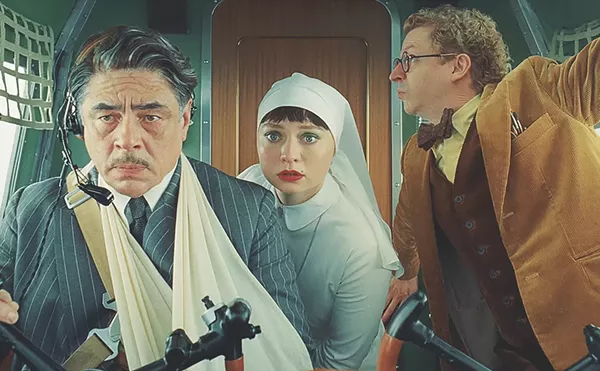
Audio By Carbonatix
[
{
"name": "GPT - Leaderboard - Inline - Content",
"component": "35519556",
"insertPoint": "5th",
"startingPoint": "3",
"requiredCountToDisplay": "3",
"maxInsertions": 100,
"adList": [
{
"adPreset": "LeaderboardInline"
}
]
}
]
The Real Blonde is about what's fake: the carefully calculated images that Americans, as willing or unwitting consumers, ingest every day.
In our commerce-driven culture, images of success, power, beauty and desire are sold alongside any product. Writer-director Tom DiCillo takes a skewed look at our image-making industry, particularly its most vapid outposts: fashion photography, music videos and soap operas.
An actor on the sidelines of success, Joe (Matthew Modine) rages at how artificial images distort reality, even as his girlfriend, Mary (Catherine Keener), pays the majority of their rent working as a makeup artist for a high-fashion photographer (a wickedly funny Marlo Thomas). Their relationship is at an impasse: an increasingly frustrated and insecure Mary (who seeks to build her confidence in a self-defense class run by a marvelous Denis Leary) sees Joe sliding further into bitter resentment because he gets more work as a waiter than acting.
Joe's audition piece, a monologue from Death of a Salesman, reflects his struggle to maintain dignity and idealism in a world that doesn't prize them. He sees a fellow waiter, the oily Bob (Maxwell Caulfield), land a lucrative soap opera gig, then learns that his fantasy girl (Elizabeth Berkley) works as a body double.
The Real Blonde could easily have been disparaging or as shallow as the world it lampoons. But Tom DiCillo is a rare combination: a satirist with a sentimental streak. DiCillo has used comedy to deflate the pretentious (Johnny Suede, Living in Oblivion) and celebrate the nonconformist (Box of Moonlight). Here he does both, taking potshots at celebrations of shallowness (MTV becomes Empty V) while making the relationship between Joe and Mary the story's crux.
In a slyly funny scene, the debate at one table turns into a restaurant-wide discussion of the pros and cons of Jane Campion's The Piano. Here, and throughout The Real Blonde, Tom DiCillo shows how the artificial has seeped so deeply into our collective unconscious that it not only becomes the topic for heated conversations, but ironically sets the standard for what's considered "real."
Serena Donadoni writes about film for Metro Times. E-mail her at letters@metrotimes.com.





